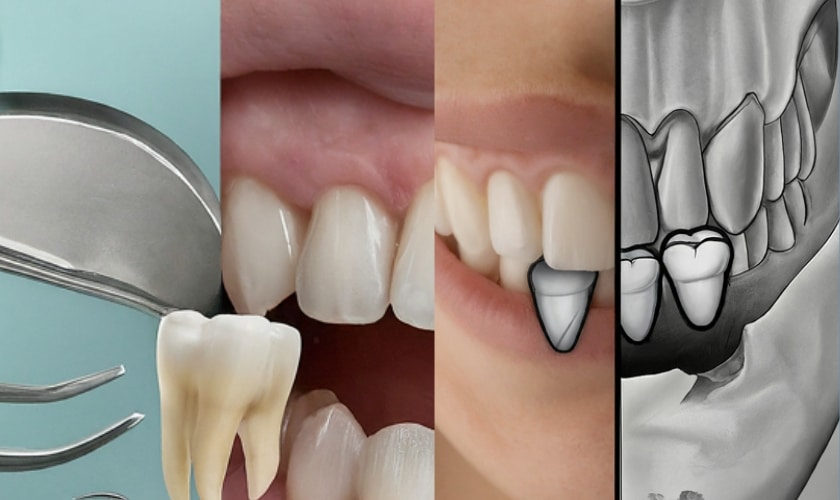
Wisdom teeth, also known as third molars, are the last teeth to erupt in the mouth, typically between the ages of 17 and 25. Unfortunately, these late bloomers often cause problems due to lack of space, leading to impaction and the need for removal. While wisdom teeth removal is a common oral surgery, a persistent fear lingers: will they break my jaw to remove them?
This blog post debunks that myth and equips you with the knowledge you need to approach wisdom teeth removal with confidence. We’ll explore the techniques used for extraction, potential complications, and tips for a smooth recovery.
Wisdom Teeth: A Potential Troublemaker
Wisdom teeth erupt at a time when the jawbone is fully developed, leaving them with limited space. This can lead to various complications, including:
- Impaction: When a wisdom tooth gets trapped beneath the gum line or bone, it becomes impacted. This can cause pain, swelling, infection, and damage to surrounding teeth.
- Crowding: Impacted wisdom teeth can push other teeth out of alignment, affecting your bite and aesthetics.
- Gum disease: Partially erupted wisdom teeth create a haven for bacteria, increasing the risk of gum inflammation and infection.
- Cysts and tumors: In rare cases, unerupted wisdom teeth can develop cysts or tumors in the jawbone.
Due to these potential problems, dentists often recommend wisdom teeth removal, especially if they show signs of impaction or other issues.
Do They Break Your Jaw To Remove Wisdom Teeth?
The good news? Breaking your jaw is not a standard procedure for wisdom teeth removal. Oral surgeons and dentists employ various techniques to extract wisdom teeth safely and effectively, even for impacted ones. Here’s a breakdown of the typical process:
- Consultation and X-rays: During the initial consultation, your dentist will assess your wisdom teeth using X-rays to determine their position, angulation, and proximity to nerves and blood vessels. This information helps determine the best extraction approach.
- Anesthesia: Depending on the complexity of the surgery, local anesthesia (numbing the area) or general anesthesia (putting you to sleep) might be used.
- Gum and bone removal: In some cases, the dentist might need to create a small incision in the gum tissue and remove a portion of bone to access the wisdom tooth root. Special instruments are used for this purpose, ensuring minimal bone removal.
- Tooth sectioning: If the wisdom tooth is deeply impacted or has complex roots, the dentist might section it into smaller pieces for easier removal.
- Tooth extraction: Once access is established, the dentist will use forceps or elevators to gently loosen and remove the wisdom tooth.
- Stitches and closure: After removing the tooth, the dentist will clean the socket and may place stitches to close the incision and promote healing.
Throughout the dentist prioritizes minimizing trauma and preserving jawbone integrity.
When Can a Broken Jaw Occur During Wisdom Teeth Removal?
While breaking your jaw is not a standard procedure, it can be a rare complication (occurring in only 0.0046% to 0.0075% of cases according to studies. Here are some factors that might increase the risk:
- Underlying bone weakness: Conditions like osteoporosis can weaken the jawbone, making it more susceptible to fractures during extraction.
- Complex root structure: Wisdom teeth with very long or curved roots can be more challenging to remove, increasing the risk of accidental bone fracture.
- Surgical difficulty: Deeply impacted wisdom teeth close to nerves may require more extensive bone removal, potentially raising the risk of a fracture.
If you have concerns about jawbone weakness due to osteoporosis or other conditions, discuss them with your dentist beforehand. They can assess your individual risk factors and recommend the safest approach for your wisdom teeth removal.
Recovery After Wisdom Teeth Removal: Minimizing Discomfort
Following wisdom teeth removal, it’s normal to experience some swelling, discomfort, and bleeding. However, with proper care, you can promote a smooth recovery. Here are some tips:
- Pain management: Take prescribed pain medication as directed by your dentist.
- Ice therapy: Apply ice packs to the outside of your cheek to reduce swelling.
- Rest: Get plenty of rest to allow your body to heal.
- Soft diet: Stick to soft foods like mashed potatoes and yogurt for the first few days.
- Oral hygiene: Gently clean your mouth with warm salt water rinses to keep the extraction
Potential Complications After Wisdom Teeth Removal (Besides Broken Jaw)
While a broken jaw is an extremely rare complication, wisdom teeth removal can come with other potential side effects. Here’s a breakdown of some common ones and how to manage them:
- Pain and discomfort: As mentioned earlier, pain and discomfort are expected after surgery. Your dentist will prescribe pain medication to manage this.
- Swelling: Swelling around the extraction site is also normal and usually peaks within 2-3 days. Apply ice packs regularly to reduce swelling.
- Bleeding: Minor bleeding is expected immediately after surgery. Bite down on gauze pads provided by the dentist to control bleeding. If excessive bleeding persists, contact your dentist.
- Dry socket: This painful condition occurs when the blood clot in the extraction socket dislodges, exposing the underlying bone and nerves. Symptoms include throbbing pain, bad breath, and a visible empty socket. If you experience these signs, contact your dentist immediately.
- Infection: While proper hygiene minimizes the risk, infection is still a possibility. Signs include increased pain, swelling, and pus drainage. Consult your dentist if you suspect an infection.
- Nerve damage: In rare cases, nerves near the wisdom teeth can be irritated or damaged during surgery, leading to temporary or permanent numbness in the tongue, lip, or chin. Inform your dentist if you experience any persistent numbness.
Wisdom Teeth Removal: Making an Informed Decision
Wisdom teeth removal is a common and safe procedure when performed by a qualified dentist or oral surgeon. While a broken jaw is an extremely unlikely outcome, it’s crucial to be aware of potential complications and discuss them with your dentist beforehand.
Here are some key factors to consider when making a decision about wisdom teeth removal:
- Symptoms: Are you experiencing any pain, swelling, or other issues related to your wisdom teeth?
- X-ray findings: Do your X-rays show signs of impaction or other complications?
- Your dentist’s recommendation: What does your dentist recommend based on your individual case?
- Your overall health: Do you have any underlying health conditions that might increase the risk of complications?
By having an open discussion with your dentist and understanding the risks and benefits, you can make an informed decision about whether wisdom teeth removal is the right course of action for you.
